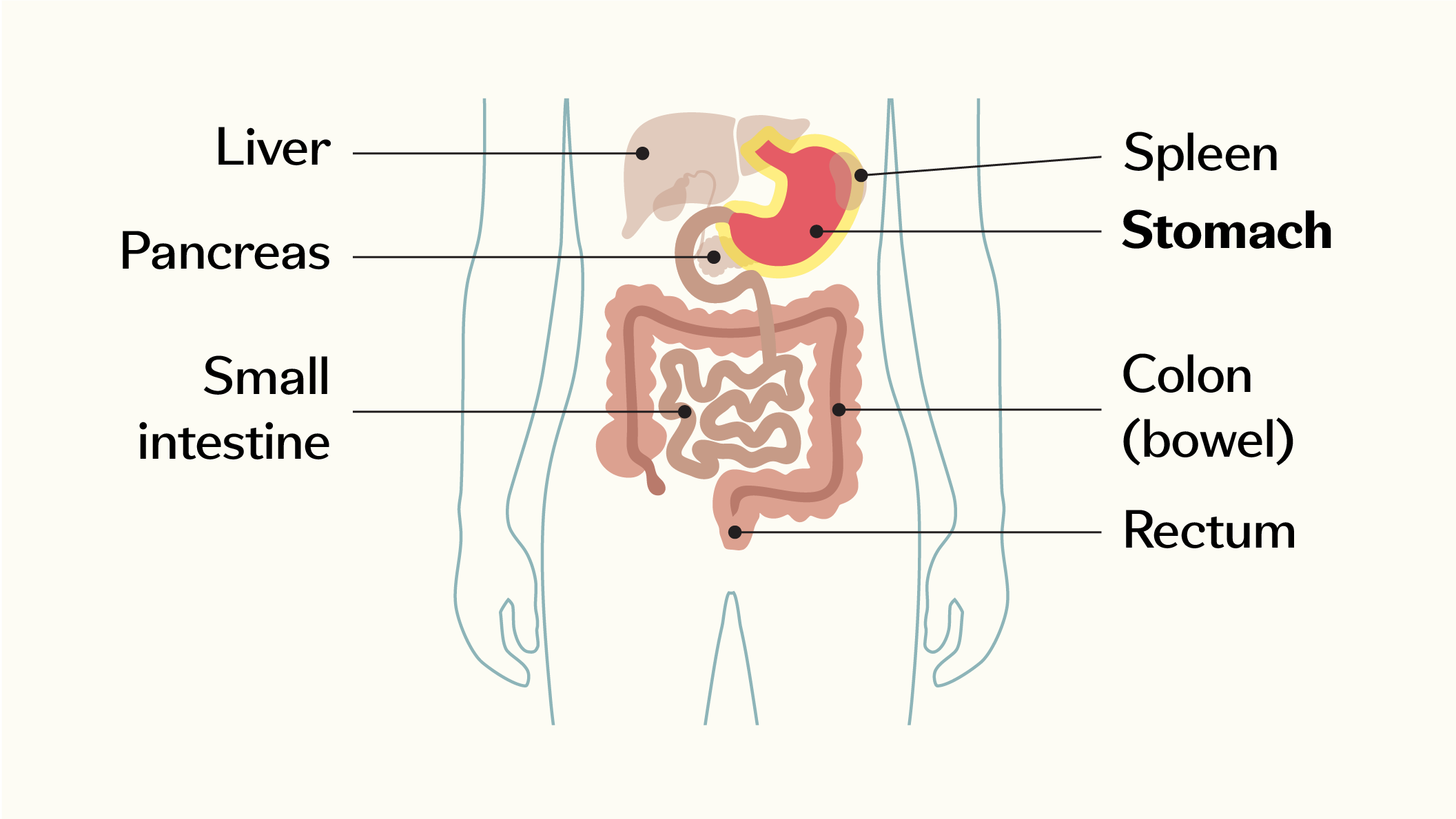The stomach
The stomach is a bag in the upper left side of the tummy, which takes in the food we eat and breaks it down. The stomach is stretchy and grows when we eat food.1

How stomach cancer starts
Cells are the building blocks for every part of your body.2 Stomach cancer develops when the cells in the stomach begin to grow and divide in an out-of-control way, creating a tumour. It is sometimes called gastric cancer.3,4
Every year, about 6,500 people receive a diagnosis of stomach cancer in the UK.*5
Often, the exact cause of stomach cancer is unknown. But there are certain factors, such as medical conditions, infections (especially Helicobacter pylori infection), and lifestyle factors, that can increase someone’s risk of developing stomach cancer.6,7
*Estimate based on the average number of people diagnosed with stomach cancer in the UK each year between 2017 and 2019.
Types of stomach cancer
There are different types of stomach cancer based on which type of cell the cancer started it.8,9
The most common type of stomach cancer is adenocarcinoma. Almost all people diagnosed with stomach cancer have this type. It starts in cells found within the stomach lining that make mucus and stomach juices.8,9
These include mucosa-associated lymphoid tissue lymphoma (also known as MALT), gastrointestinal stromal tumours (known as GISTs), neuroendocrine tumours (known as NETs) and squamous cell cancer.8,9
Treatment options for stomach cancer
Treatment for stomach cancer depends on a few things. These include which type it is, what stage it is (meaning how far and wide it has grown or spread), and the person’s general health.10,11
Common treatments for stomach cancer include:
- Surgery: If the cancer is found early, surgery might be given to take away some or all of the stomach. For some people, surgery might be used to help with symptoms10,11
- Chemotherapy: This uses anti-cancer drugs to kill the cancer cells. It can be given before surgery to make the cancer smaller, or after surgery to lower the risk of the cancer coming back. It can also be used to help with symptoms10,11
- Radiotherapy: This targets high-energy radiation at the cancer cells. It can be used with chemotherapy to lower the chance of the cancer coming back, or alone to help with symptoms10,11
- Targeted therapy: These medicines target specific features of the cancer cell that allow them to grow and survive in the body. They tend to be given to people with advanced stomach cancer11,12
- Immunotherapy: These medicines encourage the body’s immune system to fight the cancer cells11,12
Your healthcare team is there to support you and help you find the treatment that best suits you and your situation. Remember, support is available and you’re not alone in this.

If you or someone you know has been diagnosed with cancer, support groups and charities are great places to find information and connect with people going through a similar experience.

Life with cancer is different for everyone. So, if you need support, it should be personal to you. ByYourSide has been created by Pfizer to offer you practical support and guidance to help you manage life with cancer in a way that is best for you.
References
- Macmillan. The stomach. Available from: https://www.macmillan.org.uk/cancer-information-and-support/stomach-cancer/the-stomach [Accessed May 2025].
- MedlinePlus. What is a cell? Available from: https://medlineplus.gov/genetics/understanding/basics/cell/ [Accessed May 2025]
- Cancer Research UK. What is stomach cancer? Available from: https://www.cancerresearchuk.org/about-cancer/stomach-cancer/about-stomach-cancer [Accessed May 2025].
- Cleveland Clinic. Stomach cancer. Available from: https://my.clevelandclinic.org/health/diseases/15812-stomach-cancer [Accessed May 2025].
- Cancer Research UK. Stomach cancer statistics. Available from: https://www.cancerresearchuk.org/health-professional/cancer-statistics/statistics-by-cancer-type/stomach-cancer [Accessed May 2025].
- National Health Service. Stomach cancer. Causes. Available from: https://www.nhs.uk/conditions/stomach-cancer/causes/ [Accessed May 2025].
- Cancer Research UK. Risks and causes of stomach cancer. Available from: https://www.cancerresearchuk.org/about-cancer/stomach-cancer/causes-risks [Accessed May 2025].
- Cancer Research UK. Types and grades of stomach cancer. Available from: https://www.cancerresearchuk.org/about-cancer/stomach-cancer/types-and-grades [Accessed May 2025].
- Macmillan. Types of stomach cancer. Available from: https://www.macmillan.org.uk/cancer-information-and-support/stomach-cancer [Accessed May 2025].
- NHS Treatment for stomach cancer . Available from: https://www.nhs.uk/conditions/stomach-cancer/treatment [Accessed May 2025].
- Cancer Research UK. Treatment options for stomach cancer. Available from: https://www.cancerresearchuk.org/about-cancer/stomach-cancer/treatment/treatment-decisions [Accessed May 2025].
- Cancer Research UK. Targeted and immunotherapy drugs for stomach cancer. Available from: https://www.cancerresearchuk.org/about-cancer/stomach-cancer/treatment/targeted-immunotherapy-drugs [Accessed May 2025].
